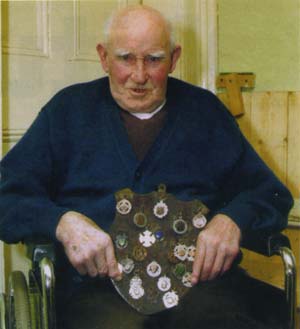Nugent, Tod
May 11, 2001

Tod Nugent with his collection of medals.
The 1930s were a golden era for Westmeath hurling and no one knows this better than Clonkills Tod Nugent, the only surviving member of Westmeaths All-Ireland Junior Championship winning team of 1936.
He may be rapidly approaching his 93th year, but former Clonkill and Westmeath hurling star Tod Nugent remains a mine of information. The only surviving member of the Westmeath team which brought the county its first and only All-Ireland Junior Hurling title in 1936, Nugent remembers that historic success as if it only happened yesterday.
"It was a marvellous occasion for Westmeath," recalls the highly active nonagenarian who played at right half back in the All-Ireland final victory over Waterford.
"The Junior All-Ireland was considered to be the next best thing to the Senior All-Ireland back then and the half of Westmeath must have been in Croke Park for the final.
"There wasn't any homecoming celebrations like what we see nowadays but we did get a free trip to London where we played the London Irish. And, of course, we had a great night in the County Hall a few months later when we were presented with our All-Ireland medals."
En route to capturing the All-Ireland crown, Westmeath chalked up a magnificent 10 straight victories, four in the Leinster League and six in the Junior Championship. They commenced their Leinster Junior Championship campaign with a facile 11-6 to 0-1 win over Longford. Westmeath then accounted for Dublin (6-7 to 5-3), Meath (6-6 to 1-1) before overcoming Laois by 4-8 to 5-2 in the provincial decider at Tullamore. Remarkably, Westmeath had led by 4-8 to 0-0 at half-time but a storming second half performance from Laois almost snatched victory.
The new Leinster champions met Antrim in the All-Ireland semi-final at Dundalk on the second last day of August. Westmeath had built up an impressive 5-3 to 0-0 lead by the interval and went on to triumph on a 9-4 to 0-2 scoreline.
The All-Ireland final against Waterford proved to be a much tougher assignment but Westmeath did enough over the hour to merit their 2-5 to 3-1 win. A wonderful defensive performance helped the Leinster men into a 0-4 to 0-1 lead at the break. In the second half, Waterford notched two early goals to move three points clear. A Tim McGrath goal restored parity for Westmeath but the Decies soon restored their three-point advantage.
In one final effort, however, Westmeath achieved a memorable victory. Colm Boland's point had reduced the deficit to two points before McGrath swooped for the winning goal with time running out. Waterford mounted a number of attacks thereafter but two breathtaking saves from Paddy Fahey kept them at bay.
One Westmeath player who must have experienced mixed emotions after the game was Pearse's midfielder Eamon Moynihan, a Waterford man who played a significant role in plotting his native county's downfall.
Victory in the All-Ireland Junior Championship enabled Westmeath to compete in the Leinster Senior Championship in 1937. The Midlanders made an immediate impact, seeing off the challenges of Laois, Meath and Offaly to qualify for a Leinster final showdown with champions Kilkenny at Portlaoise.
With 12 of the '36 crew on board, Westmeath looked as though they would create a major upset when they led going into the final quarter. But two late goals gave the Cats a fortunate 5-3 to 2-4 victory. It was the closest Westmeath would ever come to annexing a Leinster Senior Championship.
"That was a lost opportunity," regrets Tod who lined out at midfield in that final.
"After winning the Junior All-Ireland, we had built up a lot of momentum and we really should have beaten Kilkenny in '37. Kilkenny had great players like Paddy Larkin and Lory Meagher but the likes of Colm Boland, Jack Skehal, Frank Monaghan and Frank White were well capable of holding their own against them.
"Losing the '37 Leinster final was a turning point for Westmeath because the team started to break up after that. To this day, I don't think we ever managed to fulfil our potential."
Tod Nugent's recollections of hurling go back to 1917 when Clonkill won the Junior Championship. Clonkill had disbanded by the time Tod reached adulthood so, instead, he played for nearby Johnstown for two years. In 1927, Nugent and his future brother-in-law, the late Mick Scally, succeeded in reviving Clonkill. Within a year, Clonkill were crowned Junior champions, defeating Kilbeggan in the final.
Clonkill's meteoric rise continued in 1929 when they defeated Ringtown to claim the Senior Championship for the first time. They retained the championship in '30, '31 and '32 and achieved a three in-a-row of title wins between '39 and '41. Tod Nugent figured in all seven successes.
Having played his first game for Westmeath in 1929, Nugent retired from hurling in 1942. His last competitive game was the 1942 senior championship final which Clonkill lost to Ringtown. He regards Laois' Harry Gray as his toughest opponent and considers Lory Meagher to be the finest hurler of his generation. He holds many fond memories of his club career with Clonkill and recalls some titanic battles against teams such as Castlepollard, Ringtown, Brownstown and Castletown-Geoghegan.
Despite his years, Tod Nugent rarely misses a Clonkill match nowadays (he is currently club president). He is a regular spectator at Cusack Park, Mullingar and is eagerly looking forward to the day when his beloved club reclaim their place at the top of the pecking order in Westmeath senior hurling.
Most Read Stories

